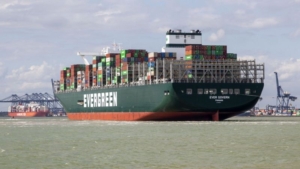Post Brexit: Fragility of supply chains exposed just weeks before ending free movement of goods

We have reported on concerns about disruption to the flow of goods and food into the UK as it leaves both the EU ‘single market’ and the EU ‘customs union’ on 31 December – irrespective of whether the Government can reach a trade ‘deal’ or not.
These concerns have been highlighted by investigative reports from the transport industry, Parliament and the Government’s own watchdog, the National Audit Office.
In February, the Government chose the ‘hard’ Brexit option. There was no legal nor as yet proven trading reason to leave both the single market and the customs union. The choice has left the nation left itself exposed to supply-chain disruption through a combination of forces that have come together towards the end of the ‘transition’ period.
The early claims of Brexit Ministers, such as David Davies and Liam Fox, that it was the ‘easiest set of negotiations imaginable’ proved wrong. Nor did the Government learn lessons from its predecessors between 2016 and 2019 – that the EU are thorough, rigorous and of tough negotiators with red-lines unanimously set by the 27 EU member states. The negotiations are going to the wire, and any ‘deal’ can now only be a ‘thin’ one – and any agreement is now at risk of failure if any of the complex steps to bring it into law falters. It is already stretching UK constitutional law, with less than the minimum statutory 21 Parliamentary ‘sitting’ days now available – unless Parliament sits every Saturday and Sunday until the New Year. The Brussels-based European Parliament is struggling to get MEPs together from across Europe due to Covid-19 – and there is no provision for them to ratify a Withdrawal Treaty by remote working.
Covid-19 has deflected attention of politicians and business leaders away from preparing for the Brexit end-game. HMRC is introducing new rules, regulations and reporting on IT systems that – according the National Audit Office – will not be ready for 1 January. Haulage Companies and shippers are only now getting guidance on what procedures are necessary. A 270-page detailed guide for importers and exporters – issued less than a month ago – is incomplete. Decisions continue to come – even at this late stage – on whether temporary staff can be recruited, and on what conditions. Law continues to evolve – for instance, this week on emissions for cars and lorries – without which there can be no certainty for manufacturers.
And Covid-19 has created other operational problems that become a ‘double-whammy’ from the end of the year. This week an announcement of disruption to smooth operations in the UK’s biggest freight terminal, Felixstowe highlights the issue. The workaround in order to keep goods flowing was to divert a container vessel to Rotterdam, unload and ferry back to the UK via London Thamesport. This contingency will not be possible after 1 January 2021 – ‘deal or no-deal’.
Felixstowe Port is privately owned and operated by Hutchison Ports who in a statement on their website, blame pre-Brexit stockpiling and the pandemic: “The Port of Felixstowe, like other major container ports worldwide, is still experiencing a spike in container volumes and dealing with the consequences of the ongoing Covid pandemic. The current high volumes will last at least into December and possibly through into the New Year, but we are working hard to minimise the impact on daily operations and to maintain vital supply chains.”
The port is presently handling 18,673 containers arriving or despatched by rail, and 29,080 containers onto or from road vehicles per week.
The BBC reported that a Taiwanese shipping firm re-directed one of its ships to bypass Felixstowe because of “serious port congestion”. An Evergreen spokesman said the firm had been told by Felixstowe’s owner that a berthing slot – where cargo is unloaded – would not be available for up to 10 days after the ship’s scheduled arrival.
Part of the problem appears to be a shipment of 11,000 containers of PPE ordered by the Government that is taking priority. There is also a record number of empty and ‘long-term’ containers taking up storage space in the docks area.
Hutchison Ports have acknowledged issues raised by hauliers with the system for booking delivery and collection slots – however, a spokesperson is reported by the BBC as saying that “improvements to the system are under way.”
We cannot overstate the risks of disruption to critical manufacturing supply-chains, to essential medical supplies – and to the 40% of food that is imported not ‘home grown’.
The Department for Transport is reported as saying that it is “aware of the issues at Felixstowe Port” and – whilst stressing that this is a “commercial matter for industry to resolve” – said it would continue to monitor the situation for any impact on wider supply chains. Monitoring is not enough, contingency plans need to be triggered now. We firmly believe that as these forces come together – it is far better to be safe than sorry.
Footnote – Extract from Parliament’s ‘Register of Members’ Financial Interests’ – as at 09 November 2020
“Grayling, Chris (Epsom and Ewell): From 1 September 2020 to 31 August 2021, Strategic Adviser to Hutchison Ports Europe, of 5, Hester Road, London SW11 4AN. I will be paid £100,000 pa, payable quarterly. Hours: around 7 hrs per week.” Interest registered 04 September 2020.
References
https://www.portoffelixstowe.co.uk/
https://www.bbc.co.uk/news/business-54908129
https://publications.parliament.uk/pa/cm/cmregmem/201109/grayling_chris.htm
